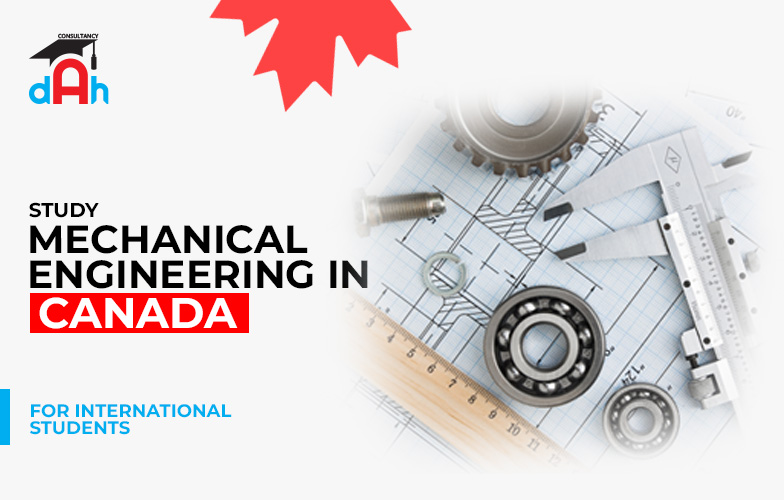Biomedical Engineering is the application of engineering principles and problem-solving approaches to biology and medicine. Biomedical engineers employ technology and medical advances to design innovative devices and equipment to improve human health.
This intake, apply to study Biomedical Engineering in Canada as the country has various benefits and opportunities for students.
Table of Contents: Study Biomedical Engineering in Canada from Nepal
- Benefits of studying Biomedical Engineering in Canada
- Total cost to study Biomedical Engineering in Canada from Nepal
- Top Biomedical Engineering courses in Canada: Specializations in Biomedical Engineering in Canada for International Students
- Biomedical Engineering Undergraduate Program in Canada from Nepal
- Eligibility Requirements for Biomedical Engineering Undergraduate Program in Canada from Nepal
- IELTS Requirements for Biomedical Engineering Undergraduate Program in Canada from Nepal
- Documents Required for Biomedical Engineering Undergraduate Program in Canada from Nepal
- Total Cost to study Biomedical Engineering Undergraduate Program in Canada from Nepal
- Biomedical Engineering Postgraduate Program in Canada from Nepal
- Eligibility Requirements for Biomedical Engineering Postgraduate Program in Canada from Nepal
- IELTS Requirements for Biomedical Engineering Postgraduate Program in Canada form Nepal
- Documents Required for Biomedical Engineering Postgraduate Program in Canada from Nepal
- Total Cost to study Biomedical Engineering Postgraduate Program in Canada from Nepal
- Masters in Biomedical Engineering in Canada for International Students
- Eligibility Requirements for Masters in Biomedical Engineering in Canada for International Students
- IELTS Requirements for Masters in Biomedical Engineering in Canada for International Students
- Documents Required for Masters in Biomedical Engineering in Canada form Nepal
- Total Cost to study Masters in Biomedical Engineering in Canada for International Students
- Top Biomedical Engineering Universities and Colleges in Canada for International Students
- Top Biomedical Engineering Jobs and Salary in Canada: Scope of studying Biomedical Engineering in Canada
- Conclusion: Study Biomedical Engineering in Canada
- FAQs on study biomedical engineering in Canada:
Benefits of studying Biomedical Engineering in Canada
Canada is blooming in the fields of development and technology. Students from different corners of the world come to study and gain career opportunities in biomedical engineering in Canada.
Some of the benefits of studying biomedical engineering programs in Canada are:
- Globally Recognised Canadian Degree. Students with a Canadian degree can study and work anywhere in the world. Canada’s universities and degrees are recognized worldwide.
- Highly Paid Jobs. There are a variety of occupations available in the bioengineering field for both international and domestic students, and they can work part-time or full-time. They are paid well, more than other types of jobs.
- Specializations to study. There are various specializations studying biomedical engineering in Canada.
- Top Ranked Universities. Canadian universities are frequently cited as the world’s top universities. More than ever, engineering holds a decent reputation among everybody.
You might also be interested to study about Study in Canada from Nepal
Total cost to study Biomedical Engineering in Canada from Nepal
Studying Biomedical Engineering in Canada costs more than other subjects, such as arts, music, health, and so on. Studying engineering costs quite a lot and Bioengineering Engineering costs more than other engineering in comparison.
The total cost to study biomedical Engineering in Canada costs CAD 10,000 to 70,000 per year.
Top Biomedical Engineering courses in Canada: Specializations in Biomedical Engineering in Canada for International Students
Canadian students studying biomedical engineering have a variety of specialization alternatives. The best biomedical engineering courses in Canada provide a variety of specializations, allowing students to choose the topics that interest them.
Specializations in Biomedical Engineering in Canada are:
- Bioinstrumentaion: The practice of monitoring, assessing, and treating biological systems is the core of the biomedical engineering specialty known as “bioinstrumentation,” which is sometimes known as “biomedical instrumentation.”
- Genetic Engineering: The technique of directly modifying an organism’s DNA through biotechnology is known as genetic engineering. Scientists employ genetic engineering to improve or change the characteristics of living animals. The goal of genetic engineering is to alter the inherited traits of a cell.
- Clinical Engineering: Clinical engineers train and manage biomedical device staff and collaborate with regulatory agencies on hospital inspections. A branch of biomedical engineering in Canada focuses on utilizing medical technology to improve the healthcare system.
- Biomaterials: The study of naturally occurring or laboratory-produced compounds for use in medical supplies or implants, such as tissue engineering, drug transport, or nano implantation.
Biomedical Engineering Undergraduate Program in Canada from Nepal
Undergraduate programs in Canada are typically four years long, with some universities and colleges offering courses that last up to five years. Canada provides numerous opportunities to students, both domestic and international, and students from all over the world are welcome to study biomedical engineering undergraduate programs in Canada.
Eligibility Requirements for Biomedical Engineering Undergraduate Program in Canada from Nepal
- must be at least 18 years old.
- must have been fully vaccinated against COVID-19.
- Participation in a Designated Learning Institution (DLI)
- Prove your financial stability.
- Obey the laws and regulations.
- Have a clean background and get a police certificate (if necessary)
- Convince them that you will leave Canada once your study visa ends.
IELTS Requirements for Biomedical Engineering Undergraduate Program in Canada from Nepal
- IELTS score of 6.5 on each segment of English Proficiency (Reading, Writing, Listening, and Speaking)
- French: Although language proficiency is not necessary for French, it is the second most spoken language in Canada, and learning French may open doors to a wide range of opportunities.
Documents Required for Biomedical Engineering Undergraduate Program in Canada from Nepal
- Statement of Purpose (SOP)
- Letters of Recommendation (LOR)
- Proof of English Language Proficiency
- Sponsor Letters
- Documents showing you’re more than capable of studying and living in Canada.
- Education Loan(If necessary)
- Required academic documents
Total Cost to study Biomedical Engineering Undergraduate Program in Canada from Nepal
Every university and college has its own cost to studying Biomedical Engineering Undergraduate programs in Canada. Some with four years of courses and others with five, universities charge according and programs of study also play a part.
The total cost to study the Biomedical Engineering Undergraduate program in Canada costs CAD 16,000 to 70,000 per year.
Also Read: Top Undergraduate Diploma Courses in Canada for International Students
Biomedical Engineering Postgraduate Program in Canada from Nepal
Students wanting to study postgraduate programs in Canada should meet the eligibility criteria along with English Language Proficiency. Globally recognized, Canada offers various programs of study for Biomedical postgraduate programs.
Eligibility Requirements for Biomedical Engineering Postgraduate Program in Canada from Nepal
- must be at least 18 years old.
- must have been fully vaccinated against COVID-19.
- Participation in a Designated Learning Institution (DLI)
- Prove your financial stability.
- Must have completed four years of bachelor\undergraduate level.
- Keep a clean criminal record and obtain a police certificate (if necessary)
- Convince them that you will leave Canada once your study visa ends.
IELTS Requirements for Biomedical Engineering Postgraduate Program in Canada form Nepal
- 6.5 on each of the English Proficiency sections of the IELTS (Reading, Writing, Listening, and Speaking)
- French is the second most spoken language in Canada, and while language ability is not required for it, learning it may result in a wide range of possibilities.
Documents Required for Biomedical Engineering Postgraduate Program in Canada from Nepal
- Statement of Purpose (SOP)
- Letters of Recommendation (LOR)
- Proof of English Language Proficiency
- Sponsor Letters
- Documents showing you’re more than capable of studying and living in Canada.
- Education Loan(If necessary)
- High school and undergraduate education mark sheets and certificates
Total Cost to study Biomedical Engineering Postgraduate Program in Canada from Nepal
Studying a postgraduate program in Canada is not the same for everyone as some students may get scholarships for biomedical engineering whereas others cost different on various factors such as program of study, time duration, and the university chosen.
The total cost to study Biomedical Engineering postgraduate program in Canada costs CAD 15,000 to 60,000 per year.
Also, read Postgraduate Diploma in Canada for International Students.
Masters in Biomedical Engineering in Canada for International Students
Studying for Masters in Biomedical Engineering in Canada is not the same for everyone as some students may get scholarships. Some programs are for 2 years, whereas some may not, depending on the university and the programs for study.
Eligibility Requirements for Masters in Biomedical Engineering in Canada for International Students
- must be at least 18 years old.
- must have been fully vaccinated against COVID-19.
- Participation in a Designated Learning Institution (DLI)
- Prove your financial stability.
- Must have completed four years of bachelor\undergraduate level.
- Keep a clean criminal record and obtain a police certificate (if necessary)
- Convince them that you will leave Canada once your study visa ends.
IELTS Requirements for Masters in Biomedical Engineering in Canada for International Students
- 6.5 on each of the English Proficiency sections of the IELTS (Reading, Writing, Listening, and Speaking)
- French is the second most spoken language in Canada, and while language ability is not required for it, learning it may result in a wide range of possibilities.
Documents Required for Masters in Biomedical Engineering in Canada form Nepal
- Transcripts: Copies must be official, unofficial, or certified and sent with the application.
- Statement of Purpose (SOP): To receive a study permit, one’s intent must be clear as to what one wants, and that’s to be a statement of purpose.
- LOR: Depending on the criteria of the university, the package must contain two to three letters of recommendation.
- Resume/CV: If you want to apply for graduate programs in Canada, you must keep your CV/resume up to date.
- Supporting Documents: Some colleges may want extra paperwork, such as sponsor letters, financial documents, or a research proposal.
- Proof of English language proficiency is required for international students from non-native English-speaking nations. These consist of test results from IELTS, TOEFL, etc. For an exemption from the requirement to provide tests In order to study in Canada, applicants may additionally submit additional papers.
Total Cost to study Masters in Biomedical Engineering in Canada for International Students
The total cost to study Masters in Biomedical Engineering in Canada varies from one university to another along with the courses it offers, the time duration of the study, and other various factors.
The yearly cost of studying for a master’s in biomedical engineering in Canada is CAD 10,000 to 30,000.
Also, read Study Masters in Canada from Nepal.
Top Biomedical Engineering Universities and Colleges in Canada for International Students
Students have many possibilities because Canada has so many biomedical engineering universities and colleges. The universities are renowned and recognized internationally for their teaching methods and courses.
The following are a few of Canada’s top institutions that offer the program:
| S.N | Universities | Biomedical Engineering Courses |
| 1. | University of Toronto | Master of Biomedical Toxicology Master of Engineering in Biomedical EngineeringMASc in Biomedical Engineering |
| 2. | McMaster University | Bachelor of Chemical Engineering and Biomedical Engineering MASc in Biomedical Engineering Bachelor of Integrated Biomedical Engineering and Health Sciences |
| 3. | Ryerson University | MENG in Biomedical Engineering Bachelors of Engineering in Biomedical Engineering |
| 4. | University of Ottawa | Master of Engineering in Biomedical Engineering BSc in Biomedical Mechanical Engineering Master of Applied Science in Biomedical Engineering |
| 5. | McGill University | Bachelor of Engineering in Biomedical EngineeringMaster of Engineering in Biological and Biomedical Engineering |
| 6. | University of British Columbia | Master of Applied Science in Biomedical Engineering Master of Engineering in Biomedical Engineering Bachelor of Applied Science in Biomedical Engineering |
| 7. | Western University | BESc in Biomedical Engineering MESc in Biomedical Engineering Bachelors of Engineering Science in Chemical Engineering and Biomedical Engineering |
| 8. | University of Saskatchewan | MSc in Biomedical Engineering MEng in Biomedical Engineering PG Diploma in Biomedical Engineering |
Top Biomedical Engineering Jobs and Salary in Canada: Scope of studying Biomedical Engineering in Canada
Students get a Post-Graduate Work Permit (PGWP) to stay and work in Canada after their graduation. Some of the top biomedical Engineering jobs and salaries in Canada are:
| S.N | Biomedical Engineering Jobs in Canada | Starting Annual Salary (Average) |
| 1. | Rehabilitation Engineer | CAD 40,000 |
| 2. | Manufacturing Engineer | CAD 60,000 |
| 3. | Biomedical Scientist | CAD 80,000 |
| 4. | Biomaterial Engineer | CAD 60,000 |
| 5. | Forensic Scientist | CAD 55,000 |
| 6. | Biotechnologist | CAD 90,000 |
| 7. | Microbiologist | CAD 75,000 |
| 8. | Toxicologist | CAD 80,000 |
Conclusion: Study Biomedical Engineering in Canada
International students prefer Canada to study biomedical engineering because it offers everything an engineering enthusiast seeks: job opportunities, exposure to growth, and a secure environment to live in.
Consultancy dAh helps students as they make decisions and submit applications to study in Canada. From helping with college or university, the application procedure, language ability, counseling, and much more.
FAQs on study biomedical engineering in Canada:
Is Canada good for biomedical engineering?
Biomedical Engineering is one of the courses with many specialties and programs, and it is offered at a number of top schools and colleges. So, yes, biomedical engineering is good to study in Canada.
Is Biomedical Engineering in demand in Canada?
Numerous students from all over the world travel to Canada to study biomedical engineering, and the country is home to many renowned universities. Additionally, the nation offers a wide range of specializations. Also, employment options exist. So, yes, there is a demand for biomedical engineering in Canada.
Which universities offer students the opportunity to study biomedical engineering in Canada?
Some of the universities that offer students the opportunity to study biomedical engineering in Canada are:
– University of Ottawa
– University of Saskatchewan
– University of Windsor
– University of Calgary
– University of Toronto
– McMaster University
– Western University




